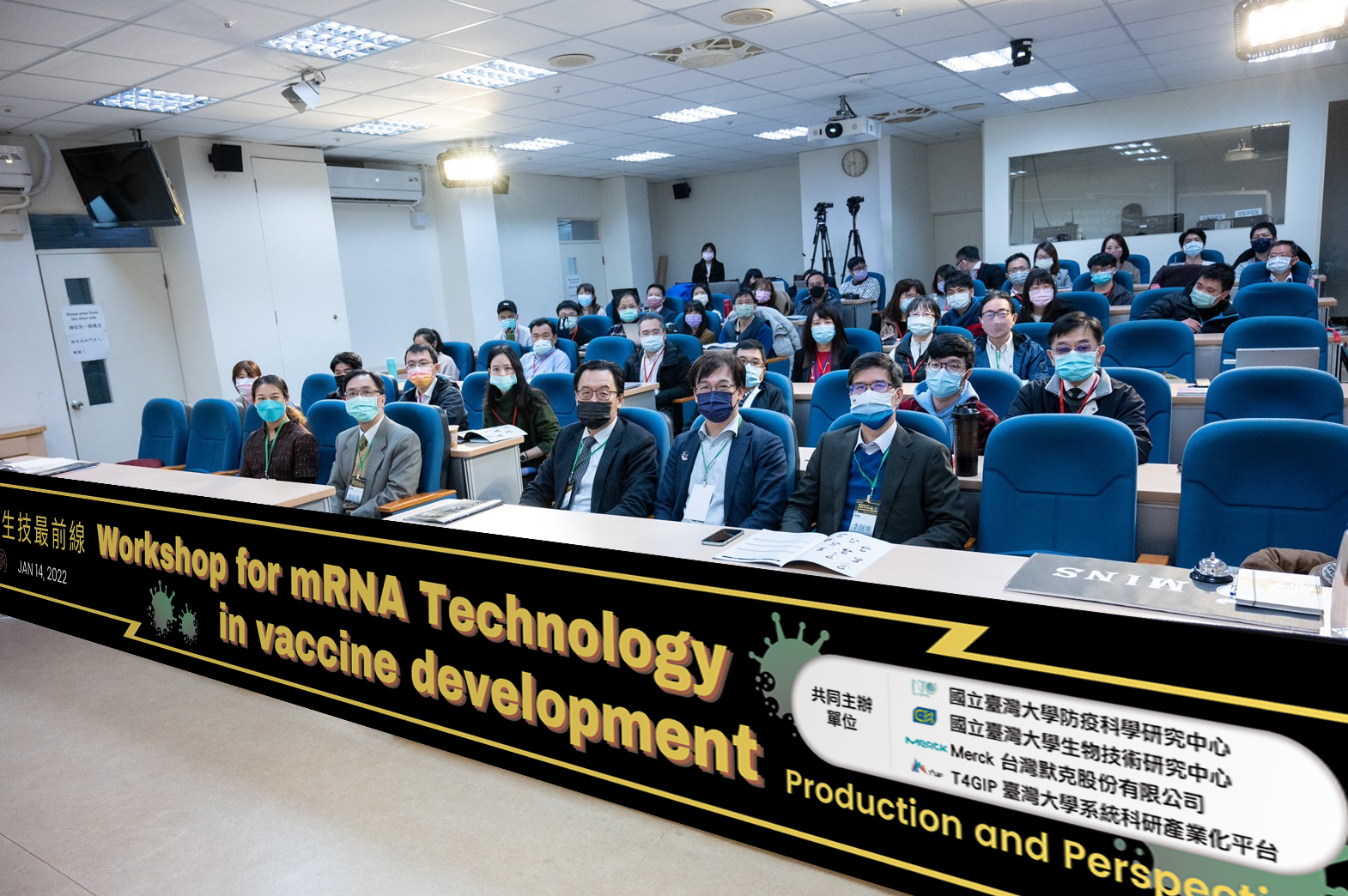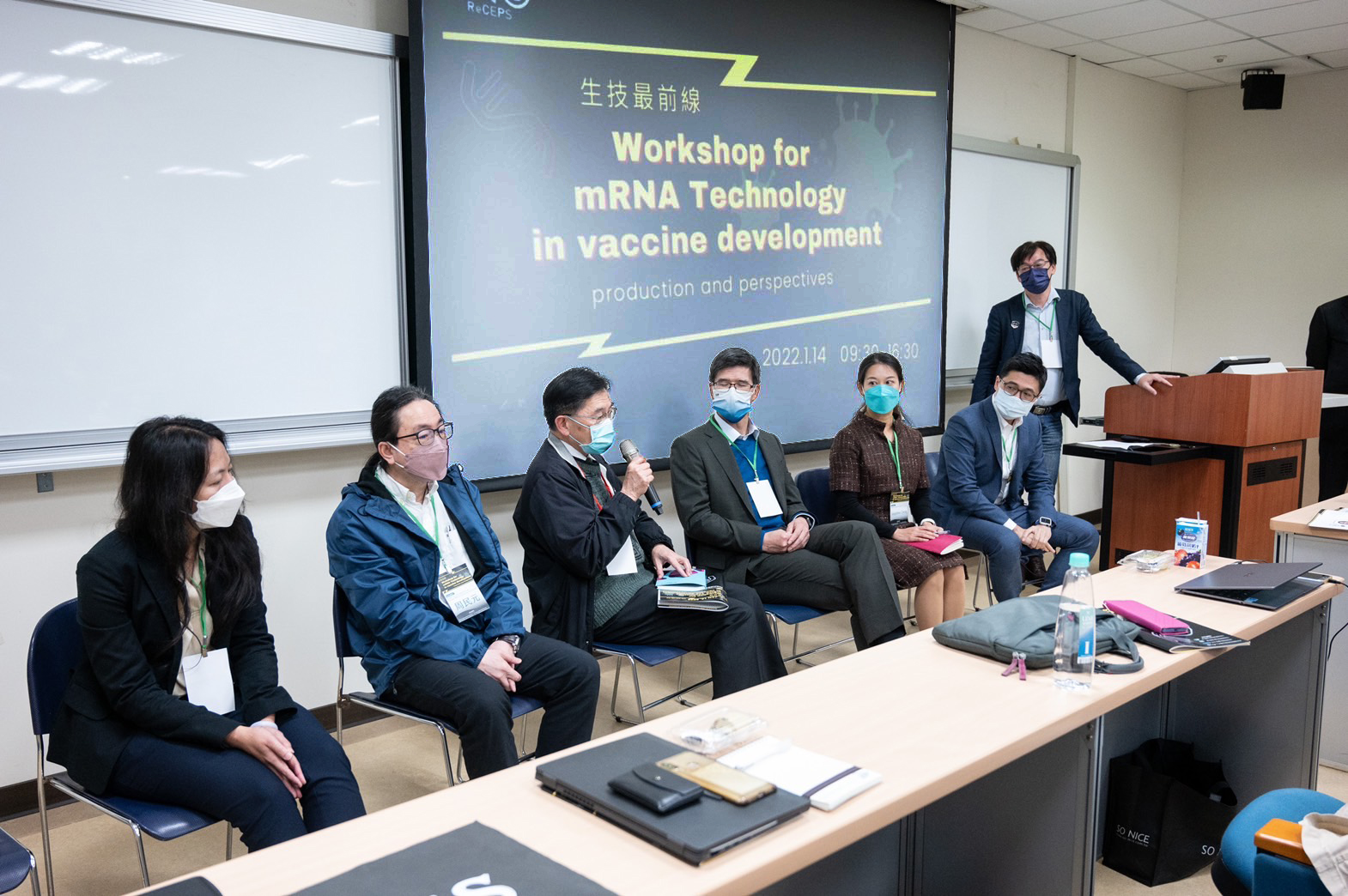Experts from academia, research, and industry gathered at the National Taiwan University (NTU) Center of Biotechnology on January 14, 2022, for a full-day workshop, focusing on the production and perspectives for mRNA technology in vaccine development. Hosted by the NTU Research Center for Epidemic Prevention Science (NTUReCEPS), NTU Center of Biotechnology, NTU Industry Liaison Office (NTU ILO), Merck Taiwan, and The Global Industry Platform of NTU System (T4GIP), and supported by the Development Center for Biotechnology (DCB), the Biomedical Technology and Device Research Laboratories (BDL) of the Industrial Technology Research Institute (ITRI), and the NTU Pharmaceutical Industry Innovative Education Promotion Center, the workshop provided a comprehensive overview of the development process of mRNA vaccines and drugs, from research to commercial bioprocessing.

Photo 1: Group photo of the speakers and guests
The opening remarks were given by Dr. Pai-Chi Li, Vice President of Research and Development and Director of Industry Liaison Office, NTU, and Dr. Yen-Hsuan Ni, Dean of the College of Medicine at NTU and Head of NTUReCEPS. Dr. Li noted the broad range of topics and experts included in the workshop and further stated that, as the biotechnology industry is a lifesaving industry in the literal sense, talent cultivation and collaboration between industry and academia in this field is key. Dr. Ni also stressed the importance of the biotech industry and encouraged both academia and industry to target the field of mRNA for research and development, as the current COVID-19 pandemic has highlighted the value of mRNA vaccines and precipitated the development of mRNA technologies.

Photo 2: Opinions exchange in the panel discussion
A total of eight talks were presented in the workshop, with the first speaker being Dr. David Loong, Senior Consultant of Novel Modalities Bioprocessing Strategy for the Asia-Pacific Region at Merck. Dr. Loong compared current vaccine technologies and noted several key advantages for mRNA vaccines, including better safety, fast production, and flexible design. In addition, Dr. Loong stated that developing and mastering mRNA technologies, which could be used for the production of multiple vaccines, would greatly facilitate cost reduction. Following Dr. Loong’s talk, Josephine Cheng, Senior Consultant of Core Modalities Bioprocessing Strategy for the Asia-Pacific Region at Merck, discussed vaccine manufacturing in the post-pandemic era and underlined three major trends: novel platform technologies, digitalization, and automated bioprocessing 4.0. The importance of reliable platform technologies and templates was also stressed, as these can reduce development time, facilitate standardization and expedite regulatory approval.
mRNA production was also a major topic at the workshop, with Dr. Loong presenting a detailed overview of mRNA bioprocessing, and Dr. Lili Meng, Formulation Business Development Manager at Merck, giving two separate talks on mRNA lipid-based delivery systems and mRNA custom manufacturing services. In addition, Dr. Min-Yuan Chou, Division Director of Diagnostics and Precision Medicine Technology at BDL, ITRI, reviewed the development of mRNA production systems and shared many of his own related experiences. All three speakers stressed the importance of using high quality raw materials and developing a validated and optimized production process. Dr. Chou also mentioned the limitations posed by raw material availability and patent restrictions and suggested that active measures should be taken to address these issues. Dr. Loong and Dr. Meng thereupon expressed strong interest from Merck in working with local universities and biotech/pharma businesses to develop novel mRNA-based therapeutics.
Basic research remained a key focus on the workshop, and as early pioneers in the development of nucleic acid-based therapeutics, Dr. Tsai-Kun Li, Vice President of DCB, and Dr. Wei-Kuang Chi, Distinguished Consultant at DCB, both shared their valuable experiences in drug development and noted the opportunities for CDMOs (contract development and manufacturing organizations). The final talk was given by Dr. Hsueh-Ping Chu, Assistant Professor at the NTU Institute of Molecular and Cell Biology, who spoke about her latest research findings in mRNA non-coding regions, and pointed a way forward for future research and development.
In the subsequent panel discussion, Rusty Chen, Head of Process Solutions at Taiwan Merck, reiterated the importance of mRNA in future drug development, and emphasized that Merck was ready to provide the necessary knowledge, training, consulting, and services to academia and industry in Taiwan. In closing, Dr. Tang-Long Shen, Director of the NTU Center of Biotechnology, drew attention to the fact that although mRNA technology had been in development for some 50 years, only now was it entering a rapid maturation phase, in which players that could rapidly line up the necessary technologies and resources stood to gain the most. Therefore, Dr. Shen announced that the NTU Center of Biotechnology would continue to host related symposia, workshops, and courses, to provide a platform for students, faculty, researchers, industry personnel, and government representatives aspiring to develop mRNA-based therapeutics, and facilitate mutual collaboration and support to accelerate the arrival of homegrown mRNA vaccines and drugs in Taiwan.